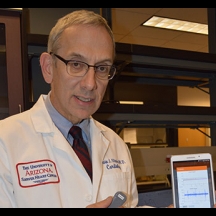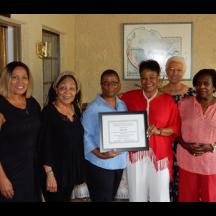News
03/12/2019
The free 2019 Green Valley Lecture Series continues with a focus on stroke prevention and atrial fibrillation.
03/06/2019
The future of medicine in many ways already is here – and is being discussed and exhibited at the University of Arizona Student Union Memorial Center.
02/14/2019
Wellness expo, free health lecture by university heart specialists, March 5
02/11/2019
The free 2019 Green Valley Lecture Series continues with a focus on aortic diseases.
01/24/2019
If protecting others from risk of infection wasn’t reason enough to get a flu shot, here’s one more. Did you know that vaccination could potentially reduce the risk of a silent killer? Although the correlation isn’t yet clearly understood, recent research has shown that aortic aneurysm ruptures often closely follow a bout of flu.
01/11/2019
Focused on scientists early in their careers or education, University of Arizona Sarver Heart Center Investigator Award recipients for 2018-2019 include an undergraduate, graduate students and early-career faculty members who represent molecular science, physiology and cardiology, among others.
01/04/2019
The 2019 free Green Valley Lecture Series begins with a focus on sleep and how it affects heart health.
01/03/2019
Jared Churko, PhD, assistant professor, Cellular and Molecular Medicine, spoke with Leslie Tolbert, PhD, regents professor emerita, Neuroscience at the University of Arizona, about using iPS cells to study patient-specific diseases, test drugs most likely to work on a given patient, and even replace diseased tissues.
12/20/2018
A cardiovascular research team at the University of Arizona Sarver Heart Center investigated in a lab model whether metformin, a common diabetes drug, could be an effective treatment for heart failure with preserved ejection fraction (HFpEF). The researchers found that the drug reduced left ventricular stiffness, thereby improving capacity for exercise. Metformin relaxes the left ventricle by making a heart muscle protein called titin more compliant.
12/05/2018
Cheryl Alli was acknowledged for her years as a community volunteer; Alpha Phi Sorority featured Sarver Heart Center at their Red Dress Gala; medical students developed Spanish-language chest-compression-only CPR materials; and Dr. Nancy Sweitzer was honored as the Mary Anne Fay Women's Heart Health Advocate of the Year.











